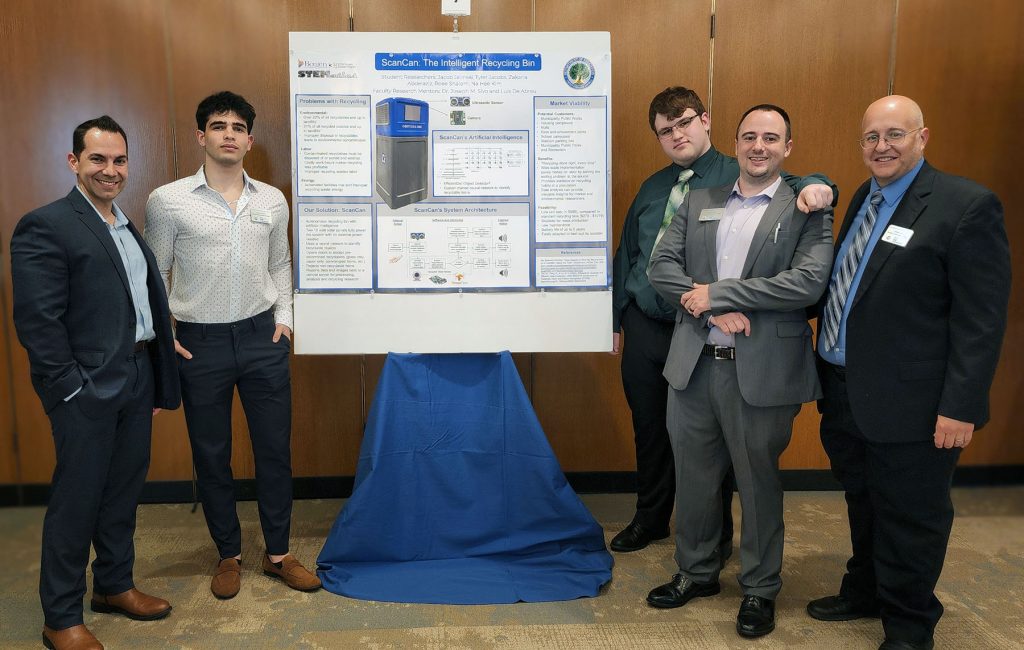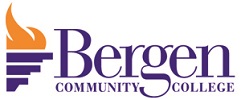Find your path to success with a diverse range of more than 120 degree, certificate, and continuing education programs.

Members of Bergen Community College’s first-place winning team.
WASHINGTON, D.C. – Students from Bergen Community College have earned first place honors in the national Community College Innovation Challenge sponsored by the National Science Foundation and American Association of Community Colleges. The event features community college student teams working with a faculty or administrator mentor to use STEM to solve real-world problems. Selected from more than 40 submissions and 12 finalists, the Bergen team topped the competition with “ScanCan: The Intelligent Recycling Bin,” a waste receptacle that rejects items unsuitable for recycling.
“Winning first place at the Community College Innovation Challenge validates that the very unique STEM research operation at Bergen Community College is generating top-notch and high-profile research projects and fostering the talent of our students,” STEM Program Director Luis De Abreu said. “We are very happy to see that organizations such as AACC and the NSF value the hard work of our students and create incentives like the CCIC to continue promoting this kind of work.”
Bergen students Tyler Jacobs, of Nutley; Jacob Jalinski, of Wood-Ridge; and Roee Shalom, of Fair Lawn, along with research mentors Professor Joseph Sivo, Ph.D., and De Abreu, developed the ScanCam prototype at the College’s STEM Student Research Center – the nation’s only one of its kind at a community college. The facility features large “showcase” windows that enable observation from outside the center, a drones/robotics wing, a MakerSpace and mini-course classroom.
The ScanCam solar-powered recycling bin developed at the facility identifies, accepts or rejects recyclable objects ensuring collections free of non-recyclable waste. The device features computer vision artificial intelligence to detect items “learned” through uploaded images of objects, such as plastic bottles, to build a reference library.
When discussing the team’s success, Jacobs, Jalinski and Shalom all credited Bergen’s research center, STEM program and research mentors. More than 2,000 students enroll in Bergen’s STEM offerings.
“The Bergen STEM program has provided us with a place to develop our abilities as engineers and challenge us with difficult and cutting-edge research projects,” Jacobs said.
“Taking first place is definitely a fantastic feeling, but it couldn’t have been done without the research team that works at Bergen,” Shalom said.
“We won because we had the tools and environment needed for students to succeed,” Jalinski said. “Because of this, our projects are more advanced than anything else done at the community college level. I see our win not as a success for my team, but as living proof that community college students are capable of so much more than they currently do.”
The group’s mentor, Sivo, echoed that sentiment.
“I am extremely proud and grateful to our student team members for their enthusiasm, dedication and performance working on the ScanCan project and excelling in the 2022 CCIC,” Sivo said. “The challenge demonstrates that solutions to real-world problems can be developed at the community college level and that innovation is not just limited to the four-year and graduate-level institutions. I look forward to one day seeing ScanCan commercialized and in use in our parks and other public places throughout the state and country.”
To learn more about the event, visit aaccinnovationchallenge.com.
Based in Paramus, Bergen Community College (www.bergen.edu), a public two-year coeducational college, enrolls more than 13,000 students at locations in Paramus, the Philip Ciarco Jr. Learning Center in Hackensack and Bergen Community College at the Meadowlands in Lyndhurst. The College offers associate degree, certificate and continuing education programs in a variety of fields. More students graduate from Bergen than any other community college in the state.
# # #
